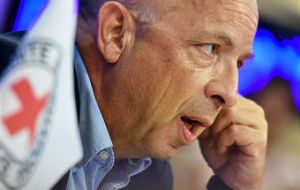MercoPress. South Atlantic News Agency
Falklands: Red Cross exhumation of Argentine remains in three phases
 “Probably on the 19th maybe a few days later, starting with the exhumation proper and the job of taking bone samples from the various human remains…”
“Probably on the 19th maybe a few days later, starting with the exhumation proper and the job of taking bone samples from the various human remains…”  The Darwin cemetery will remain closed for the public for the duration of the ICRC work, from June 18 to September 30.
The Darwin cemetery will remain closed for the public for the duration of the ICRC work, from June 18 to September 30.  Access to the cemetery will still be permitted but those wishing to enter must report to the site security staff before doing so.
Access to the cemetery will still be permitted but those wishing to enter must report to the site security staff before doing so. With 123 graves to be exhumed but 140 families waiting for news, the exhumation and identification of Argentine war dead in the Falklands will bring answers to some families, but not every family involved, Head of the International Committee of the Red Cross (ICRC) and Operational Coordinator for the project to identify the remains of Argentine soldiers buried at Darwin Cemetery.
Laurent Corbaz, explained apart from that anomaly, previous experiments in other contexts had shown, “there were always tricky cases where you are not 100% sure, and where it is difficult to give a green light for positive [DNA] matching.”
Mr. Corbaz was interviewed by Penguin News in Stanley, where he arrived last Saturday ahead of the rest of the team which will arrive on June 15. He spoke of the three phases involved in the project, the first of which is currently finishing. This involved making sure they had in place all of the, “logistical, legal, political and administrative arrangements,” so as to make sure the operation could take place “in the best conditions possible.”
Now that the required equipment has arrived in the Falklands the second phase will begin, “probably on the 19th maybe a few days later, starting with the exhumation proper and the job of taking bone samples from the various human remains…”
This phase is expected to last until the end of August. And the third phase will be the analysis of the results and reporting to families, and the government concerned which is expected to take place by the end of the year, said Mr Corbaz.
In the meantime and parallel to the whole process, “my colleagues in Argentina have also been dealing with the government and the Ministry of Justice so as to make sure all the families concerned are first of all in agreement with the process.” He confirmed this was the case and that families had given all they have in relation to DNA samples, and any other ante-mortem information.
Soil will also play a part in identification. The soil at the cemetery is rather acid which is, “a good sign with preservation of soft tissue,” so it might assist with identification. However, it may be a bad sign in relation to DNA preservation said Mr Corbaz, “or because there is not enough information or secure matching with DNA samples collected from families.”
He said: “We are pretty sure to have some success but are rather prudent with the amount of success we may have. The highest percentage is not what we can aim for.” Once the results are obtained the ICRC will, “still accompany the process in Argentina. …and make sure it is done to the highest standard possible.”
A psychologist will be with the families when they receive the result: “Whether it is to give a positive answer which is then a confirmation of death or to give a negative answer which means an impossibility to say where the relative disappeared.”
That is where the ICRC responsibility ends. Mr Corbaz said his mandate was not about, “transfer of bodies elsewhere than where they are; we will simply re-bury them here…” A Catholic blessing will be given over the graves when the remains are re-buried.
Currently in the Falklands are Mr Corbaz, and two IT Technicians who are installing the equipment at the cemetery. Next to arrive will be the Head of the Forensic Team Maurice Tidball-Binz (who has visited the Falklands before) and approximately ten scientists. The scientists include ICRC forensic experts, others from the San Sebastian University in Spain specially hired for the project, and “then according to the agreement between the UK and Argentina,” two forensic experts from Argentina and two from the UK. They will be residing at Darwin Lodge.
A statement from the Falkland Islands Government noted that they had put in place the necessary legal arrangements for the exhumation and would provide any logistical support requested to “facilitate this important humanitarian work.”
The Darwin Cemetery will be fenced and closed to the public for the duration of the ICRC work which is expected to last from June 18, 2017 to September 30, 2017 inclusive, according to the FIG release. (Penguin News)




Top Comments
Disclaimer & comment rules-

-

-

Read all commentsIdentify them and ship them back home where they can be with their families in honor and rest in peace.
Jun 09th, 2017 - 11:57 am +3If the Argentines had abided by the binding UN resolution to vacate the islands after their illegal land grab back in 1982, there wouldn't be any “war” dead to identify.
Jun 10th, 2017 - 05:47 pm +1Falklands - Terra do falcão - É um demônio!
Jun 09th, 2017 - 04:55 pm -2Commenting for this story is now closed.
If you have a Facebook account, become a fan and comment on our Facebook Page!